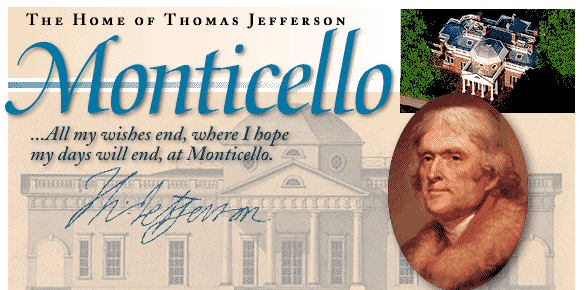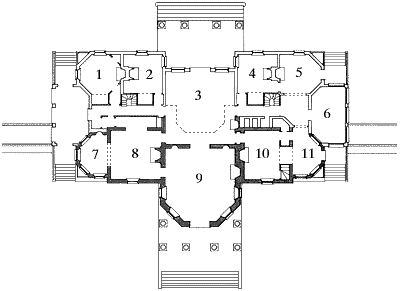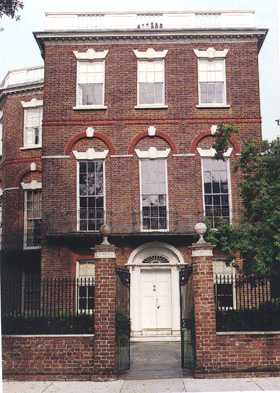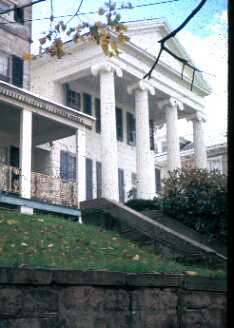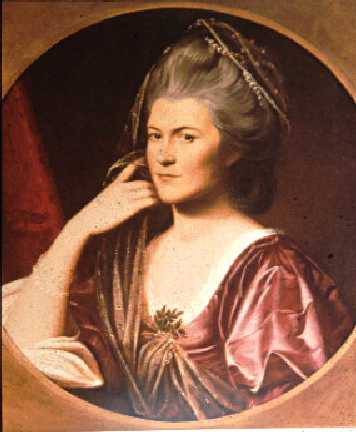The
Eighteenth Century
American Literature--
The Enlightenment
Provider:
Dr. Ron Tranquilla
|
Concept & Background in Letters from an American Farmer: III "What Is an American?" (1782) Men are like plants; the goodness and flavor of the fruit proceeds from the peculiar soil and exposition in which they grow. We are nothing but what we derive from the air we breathe, the climate we inhabit, the government we obey, the system of religion we profess, and the nature of our employment. . . . Those [Americans] who live near the sea feed more on fish than on flesh, and often encounter that boisterous element [fish, whales, etc.]. This renders them more bold and enterprising; this leads them to neglect the confined occupations of the land. They see and converse with a variety of people. . . . The sea inspires them with a love of traffic, a desire of transporting produce from one place to another; and leads them to a variety of resources. . . . Those who inhabit the middle settlements. . . must be very different; the simple cultivation of the earth purifies them, but the indulgences of government, the soft remonstrances of religion, the rank of independent freeholders, must necessarily inspire them with sentiments very little known in Europe. . . . Europe has no such class of men [as these whose characteristics are hard work, good living, attention to law, country politics, the pride of freemen]. . . . [Even farther inland, at the frontier near "the great woods"], there men seem to be places still farther beyond the reach of government. . . . There men appear to be no better than the carnivorous animals of a superior rank, living on the flesh of wild animals. . . There, remote from the power of example and the check of shame, many families exhibit the most hideous parts of our society. . . . Such is our progress, such is the march of Europeans toward the interior parts of this continent. full text: http://xroads.virginia.edu/~HYPER/CREV/home.html [TOP] A Declaration by the Representatives of the United States of America, in General Congress Assembled (1776) When, in the course of human events, it becomes necessary for one people to dissolve the political bands, which have connected them with another, and to assume among the powers of the earth the separate and equal station to which the laws of nature and of nature's God entitle them, a decent respect to the opinions of mankind requires that they should declare the causes which impel them to the separation. We hold these truths to be self-evident: that all men are created equal, that they are endowed by their Creator with inherent and inalienable rights; that among these are life, liberty, and the pursuit of happiness [John Locke, in his Second Treatise on Government, 1689, had defined them as "life, liberty, and property."]; that to secure these rights, governments are instituted among men, deriving their powers from the consent of the governed; . . . . See here for a
Rough Draft of the Declaration: (http://teachingamericanhistory.org/library/index.asp?document=4)
Thomas Paine The Age of Reason (1794) I do not believe in the creed professed by the Jewish church, by the Roman church, by the Greek church, by the Turkish church, by the Protestant church, nor of any church that I know of. My own mind is my own church. All national institutions of churches, whether Jewish, Christian, or Turkish, appear to me no other than human inventions set up to terrify and enslave mankind, and monopolize power and profit. . . . Every national church or religion has established itself by pretending some special mission from God, communicated to certain individuals. The Jews have their Moses; the Christians their Jesus Christ, their apostles and saints; and the Turks their Mahomet; as if the way to God was not open to every man alike. Each of those churches shows certain books, which they call "revelation,"or the word of God. The Jews say that their Word of God was given by God to Moses face to face; the Christians say, that their Word of God came by divine inspiration; and the Turks say, that their Word of God (the Koran) was brought by an angel from heaven. Each of these churches accuses the other of unbelief; and for my own part, I disbelieve them all. . . . Revelation, when applied to religion, means something communicated directly from God to man. . . . It is a contradiction of te rms and ideas to call anything a revelation that comes to us at second hand, either verbally or in writing. After this, it is only an account of some thing which that person says was a revelation made to him and though he may find himself obliged to beli eve it, it cannot be incumbant on me to believe it in the same manner, for it was not a revelation made to me, and I have only his word for it that it was made to him. . . . When also I am told that a woman, called the Virgin Mary, said. . . that she w as with child without any cohabitation with a man, and that her betrothed husband Joseph, said that an angel told him so, I have a right to believe them or not: such a circumstance required a much stronger evidence than their bare word for it: but we have not even this; for neither Joseph nor Mary wrote any such matter themselves. It is only reported by others that they said so. It is hearsay upon hearsay, and I do not chuse to rest my belief upon such evidence. full
text: http://www.infidels.org/library/historical/thomas_paine/age_of_reason/index.shtml
[TOP]
Letter to Ezra Stiles (President of Yale College), March 9, 1790 . . . You desire to know something of my religion. . . . Here is my creed. I believe in one God, Creator of the Universe. That He governs it by His providence. That He ought to be worshipped. That the most acceptable service we render to Him is doing good to His other children. That the soul of man is immortal, and will be treated with justice in another life respecting its conduct in this. [These are based on Lord Herbert of Chebury's "Five Points" of Deism.] As regards to Jesus of Nazareth, my opinion of whom you particularly desire, I think the system of morals and His religion, as He left them to us, the best the world ever saw or is likely to see; but I apprehend it has received various corrupting changes, and I have with most of the present dissenters in England, some doubts as to His divinity; though it is a question I do not dogmatize upon, having never studied it. . . . I see no harm, however, in its being believed, if that belief has the good consequence, as probably it has, of making His doctrines more respected and better observed; especially as I do not perceive, that the Supreme takes it amiss, by distinguishing the unbelievers in His government of the world with any peculiar marks of His displeasure. . . . Note: [TOP] No. 10 (by James Madison) Among the numerous advantages proposed by a well-constructed Union, none deserves to be more accurately developed than its tendency to brea k and control the violence of faction. The friend of public governments never finds himself so much alarmed for their character and fate as when he contemplates their propensity to this dangerous vice. He will not fail therefore to set a due value on an y plan which, without violating the principles to which he is attached, provides a proper cure for it. The instability, injustice and confusion introduced into the public councils have in truth been the mortal diseases under which popular governments hav e everywhere perished; as they continue to be the favorite and fruitful topics from which the adversaries to liberty derive their most specious declamations. . . . By faction I understand a number of citizens, whether amounting to a majority or minority of the whole, who are united and actuated by some common impulse of passion or of interest, adverse to the rights of other citizens, or to the permanent and agg regate interests of the community. . . .If a faction consists of less than a majority, relief is supplied by the republican principle [representative government rather than direct democracy], which enables the majority to defeat its sinister views by vote. . . . When a majority is included in a faction, the form of popular government on the o ther hand enables it to sacrifice to its ruling passion or interest both the public good and the rights of other citizens. To secure the public good and private rights against the dangers of such a faction, and at the same time to preserve the spirit and form of popular government, is then the great object to which our enquiries are directed. [Madison then argues that a representative republic best curbs majority factions.] . . . The influence of factious leaders may kindle a flame within their particular states, but will be unable to spread a general conflagration through the other states: a religious sect, may degenerate into a political faction in part of the confederac y; but the variety of sects dispersed over the entire face of it must secure the nat ional councils against any danger from that source; a rage for paper money, for an abolition of debts, for an equal division of property, or for any other improper or wicked project, will be less apt to pervade the whole body of the Union than a particular member of it. . . . [The Federalist was a series of papers, written by Alexander Hamilton, John Jay, and James Madison, the intention of which was to convince New Yorkers that the new ly proposed Constituion should be adopted. Many in New York and elsewhere, like Thomas Jefferson and the populists, were afraid that individual and states' rights would be dominated by a large impersonal government if the proposed Constitution were adopted (the addition of the bill of rights shortly after ratification of the Constitution was made in response to these concerns). The arguments made in The Federalist for strong central ("representative") government and treasury was the CONSERVATIVE position in 1787!] full text: http://www.jmu.edu/madison/federalist/fed10.htm
[TOP] The Constitution of the United States of America Proposed by Convention September 17, 1787. Effective March 4, 1789 We the people of the United States, in order to form a more perfect union, establish justice, insure domestic tranquility, provide for the common defense, promote the general welfare, and secure the blessings of liberty to ourselves and our posterit y, do ordain and establish this Constitution for the United States of America. . . . Amendments Article I Congress shall make no law respec ting the establishment of religion, or prohibiting the free exercise thereof; or abridging the freedom of speech, or of the press; or the right of the people peacably to assemble, and to petition the government for a redress of grievances. Article II A well regulated militia, being necessary to the security of a free State, the right of the people to keep and bear arms, shall not be infringed. Article III No soldier shall, in time of peace, be quartered in any house, without the consent of the owner, nor in time of war, but in a manner prescribed by law. Article IV The right of the people to be secure in their person, houses, papers, and effects, against unreasonable searches and seizures, shall not be violated. . . . Article V No person shall be held to answer for a capital, or otherwise infamous crime, unless on a presentment or indictment of a grand jury. . . ; nor shall any person be subject for the same offense to be twice put in jeopardy of life or limb; nor shall be compelled, in any criminal case, to be a witness against himself, nor be deprived of life, liberty, or property, without due process of law; nor shall private property be taken for public use without just compensation. Article VI In all criminal prosecutions, the accused shall enjoy the right to a speedy and public trial, by an impartial jury of the State and district wherein the crime shall have been committed. . . ; to be confronted with the witnesses against him; to have compulsory processes for obtaining witnesses in his favor, and to have the assistance of counsel for his defense. Article VII In suits at common law, where the value in controversy shall exceed twenty dollars, the right of trial by jury shall be preserved. . . . Article VIII Excessive bail shall not be required, nor excessive fines imposed, nor cruel and unusual punishment inflicted. Article IX The enumeration in the Constitution of certain rights shall not be construed to deny or disparage others retained by the people. Article X The powers not delegated to the United States by the Constitution, nor prohibited by it to the States, are reserved to the States respectively, or to the people. [These first ten amendments to the Constitution, collectively known as "The Bill of Rights," were passed by Congress on September 25, 1788, and were ratified by three-quarters of the States on December 15, 1791. Although they spell out certain rights to which all Americans are entitled, they were intended and still function as a bill of "minority" rights, protecting any minority (even a minority of a single person) from possible tyranny of the majority. Constitution of the United States of America [TOP] Letter from Thomas Jefferson to John Adams, October 28, 1813 . . . I agree with you that there is a natural aristocracy among men. The grounds of this are virtue and talent. . . . There is also an artificial aristocracy founded on wealth and birth, without either virtue or talent; for with these it would belong to the first class [the natural aristocracy]. . . . May we not . . . say that that form of government is best which provides the most effectually for a pure selection of these natural aristoi into the offices of government? The artificial aristocracy is a mischevious i ngredient in government, and provisions should be made to prevent its ascendency. On the question, What is the best provision, you and I differ; but we differ as rational friends, using the free exercise of our own reason, and mutually indulging its errors. You think it best to put the Pseudo-aristoi into a separate chamber of legislation where they may be hindered from doing mischief by their coordinate branches, and where also they may be a protection to wealth against the Agrarian and plundering enterp rises of the Majority of the people. I think that to give them power in order to prevent them from doing mischief, is arming them for it, and increasing instead of remedying the evil. For if the coordinate branches can arrest their action, so may they of the coordinates. . . Nor do I believe them necessary to protect the wealthy; because enogh of these will find their way into every branch of the legislation to protect themselves. I think the best remedy is. . . to leave to the citizens the free election and separation of the aristoi from the pseudo-aristoi, of the wheat from the chaff. In general, they will elect the real good and wise. . . . full text: http://press-pubs.uchicago.edu/founders/documents/v1ch15s61.html
[TOP] The Flourishing Village (1787?; 1794) . . . All hail, thou western world! [the United States] by heav'n designed Th' example bright, to renovate mankind. Soon shall thy sons across the mainland roam; And claim, on far Pacific shores, their home; Their rule, religion, manners, arts, convey, And spread their freedom to the Asian sea. . . . Then nobler thoughts shall savage trains inform; Then barbarous passions cease the heart to storm: No more the captive circling flames devour; Through the war path the Indian creep no more;. . . . But peace, and truth, illume the twighlight mind, The gospel's sunshine, and the purpose kind. Where marshes teem'd with death, shall meads unfold; Untrodden cliffs resign their stores of gold; . . . . Where slept perennial night, shall science rise, And new-born Oxfords cheer the evening skies; . . . . Then to new climes the bliss shall trace its way, And Tartar deserts hail the rising day; From the long torpor startled China wake; Her chains of misery rous'd Peruvia break; Man link to man; with bosom bosom twine; And one great bond the house of Adam join: The sacred promise full completion know, And peace, and piety, the world o'erflow. Timothy Dwight, "The Flourishing Village" from Greenfield Hill. Lauter, et al., eds. The Heath Anthology of American Literature, Vol. 1. Second edition. D.C. 1039-45. [TOP] Enlightenment Iimages:
Georgian architectural style, 1760
East Front of the U. S. Captitol Building, Washington, D. C. Figures personifying
Justice, America, and Hope are ================================================
Monticello Homepage on the Web Greek Revival architectural style What assumptions
do you see illustrated not only in ================================================
Floor plan of Montecello
Federalist Greek revival style
20th century: Greek Revival style, Pottsville, Pennsylvania Why would houses being built in the late 19th and 20th centuries and even today imitate this style? ================================================
Portrait of Mrs. Robert Shewell, Jr. Henry Benbridge, ca. 1771 What neoclassic elements does this portrait exhibit? [TOP]
|


